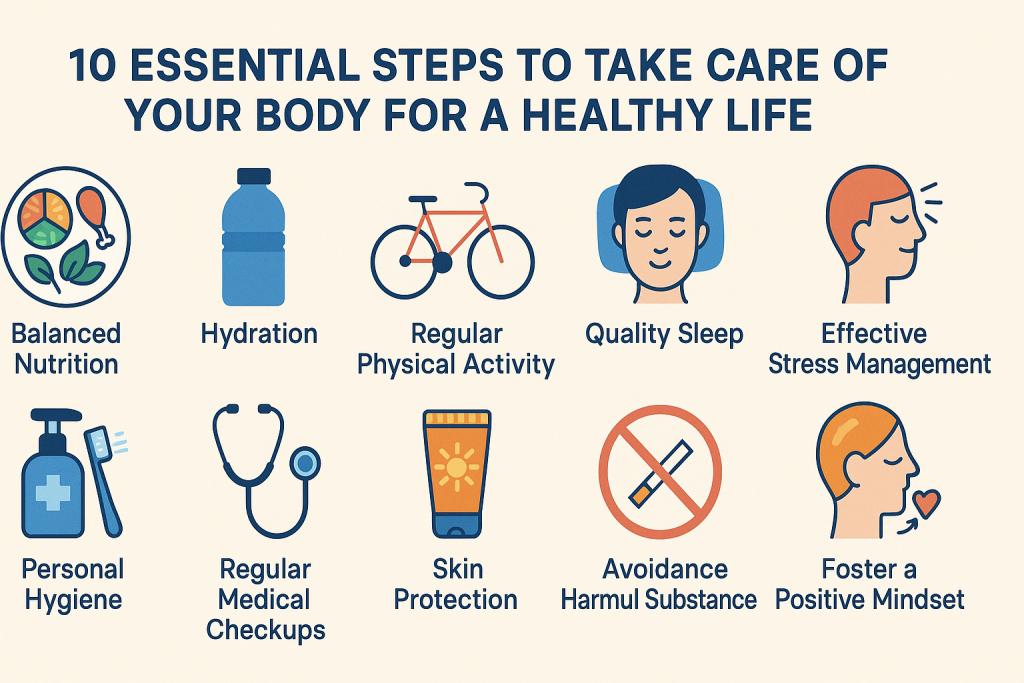Understanding the Importance of Body Care
Proper body care is the cornerstone of a healthy and fulfilling life. A well-cared-for body doesn’t just look good; it feels good and functions efficiently. Investing in your physical well-being also boosts mental clarity, strengthens immunity, and increases your longevity. According to the World Health Organization, healthy lifestyle choices can prevent up to 80% of premature heart disease and strokes.
Adopting a proactive approach to wellness doesn’t have to be overwhelming. By implementing practical and sustainable habits, you can make a significant impact on your overall health and daily energy levels. In the sections below, you’ll find 10 essential steps to help you take care of your body and elevate your quality of life.
1. Prioritize Balanced Nutrition
Food is the fuel that powers every cell in your body. A balanced diet provides essential nutrients, supports immune function, and helps maintain a healthy weight. The Centers for Disease Control and Prevention (CDC) recommends a diverse diet rich in fruits, vegetables, whole grains, lean proteins, and healthy fats.

Tips for Balanced Eating
- Fill half your plate with colorful fruits and vegetables at every meal.
- Opt for whole grains like brown rice, oats, or quinoa instead of refined grains.
- Incorporate lean proteins such as chicken, fish, legumes, and tofu.
- Limit added sugars, excess salt, and processed foods.
Remember, meal prepping and mindful grocery shopping can make healthy choices easier and more consistent.
2. Stay Hydrated Throughout the Day
Water plays a crucial role in regulating body temperature, flushing out toxins, lubricating joints, and supporting digestion. Dehydration can lead to fatigue, headaches, and even impaired cognitive function. The National Academies of Sciences recommends about 3.7 liters (men) and 2.7 liters (women) of total water per day, including from foods and beverages.

Hydration Hacks
- Carry a reusable water bottle to remind yourself to drink regularly.
- Flavor your water naturally with lemon, mint, or cucumber slices for added taste.
- Monitor the color of your urine—pale yellow is a good indicator of adequate hydration.
3. Engage in Regular Physical Activity
Exercise benefits nearly every system in the body. It strengthens muscles, improves cardiovascular health, boosts mood, and supports weight management. According to the American Heart Association, adults should aim for at least 150 minutes of moderate-intensity aerobic activity each week, plus muscle-strengthening exercises twice a week.

Ways to Stay Active
- Choose activities you enjoy, such as walking, cycling, swimming, or dancing.
- Incorporate mini-workouts throughout the day—take the stairs, stretch, or do short exercise routines at home.
- Track your progress with a fitness app or journal for motivation.
Even short bursts of activity add up, so find creative ways to keep moving.
4. Get Quality Sleep Every Night
Sleep is when your body repairs tissues, consolidates memories, and regulates hormones. Chronic sleep deprivation is linked to obesity, weakened immunity, and a higher risk of chronic diseases. Most adults need 7-9 hours of sleep per night for optimal health.

Tips for Better Sleep
- Stick to a consistent sleep schedule, even on weekends.
- Create a relaxing bedtime routine—read, meditate, or take a warm bath.
- Limit caffeine and screen exposure in the evening.
Prioritizing sleep is one of the simplest yet most effective ways to take care of your body.
5. Manage Stress Effectively
Persistent stress can take a toll on your body, causing headaches, digestive issues, and increased risk of chronic conditions. Learning to manage stress is essential for your overall well-being.
Proven Stress-Relief Strategies
- Practice mindfulness techniques such as meditation, deep breathing, or yoga.
- Engage in hobbies and activities that bring you joy and relaxation.
- Seek social support from friends, family, or professional counselors when needed.
Building resilience against stress empowers you to handle life’s challenges with greater ease.
6. Maintain Personal Hygiene
Good personal hygiene isn’t just about appearance—it also prevents infections and promotes self-confidence. Simple daily routines go a long way in protecting your health and well-being.
Daily Hygiene Checklist
- Bathe or shower regularly to remove dirt and bacteria.
- Brush and floss your teeth at least twice a day to maintain oral health.
- Wash your hands frequently, especially before eating and after using the restroom.
- Keep your nails trimmed and clean to prevent infection.
7. Schedule Regular Medical Checkups
Prevention is better than cure. Regular health screenings can help detect potential issues early and ensure you’re on track with your health goals. Routine visits with your healthcare provider also allow you to discuss any concerns or changes in your health.
Key Preventive Screenings
- Annual physical exams
- Blood pressure and cholesterol testing
- Cancer screenings (as age and risk factors indicate)
- Vaccinations and immunizations
- Dental and vision checkups
Staying proactive with healthcare appointments helps you stay in control of your well-being.
8. Protect Your Skin
Your skin is your body’s largest organ, and it serves as a vital barrier against environmental hazards. Taking care of your skin not only boosts your confidence but also prevents premature aging and reduces the risk of skin cancer.
Healthy Skin Habits
- Apply sunscreen daily, even on cloudy days.
- Moisturize regularly to maintain skin hydration.
- Avoid excessive sun exposure and wear protective clothing outdoors.
- Stay hydrated and consume foods rich in antioxidants for skin health.
9. Avoid Harmful Substances
Limiting or eliminating harmful substances is essential for sustaining long-term health. This includes avoiding tobacco, limiting alcohol, and being mindful of medications or substances that could harm your body.
Substance Avoidance Tips
- Avoid smoking and secondhand smoke exposure.
- Consume alcohol in moderation, if at all.
- Follow all medication instructions and consult your doctor before starting new supplements.
Making conscious choices about what goes into your body empowers you to take control of your health.
10. Foster a Positive Mindset and Self-Care Routine
True body care goes beyond physical habits—it also involves nurturing your mental and emotional well-being. Cultivating a positive attitude can boost your immune system, reduce stress, and promote longevity.
Ways to Support Mental Wellness
- Practice gratitude by journaling or reflecting on positive experiences.
- Set realistic goals and celebrate your achievements, big or small.
- Establish a self-care routine that includes activities you love, such as reading, spending time in nature, or creative pursuits.
Conclusion: Transform Your Health with Consistent Care
Taking care of your body is an ongoing journey that pays lifelong dividends. By adopting these 10 essential steps—from balanced nutrition and hydration to regular exercise, sleep, and self-care—you lay the foundation for lasting wellness. Remember, small changes can lead to big results. Start today, stay consistent, and enjoy the full benefits of a healthy, vibrant life.


